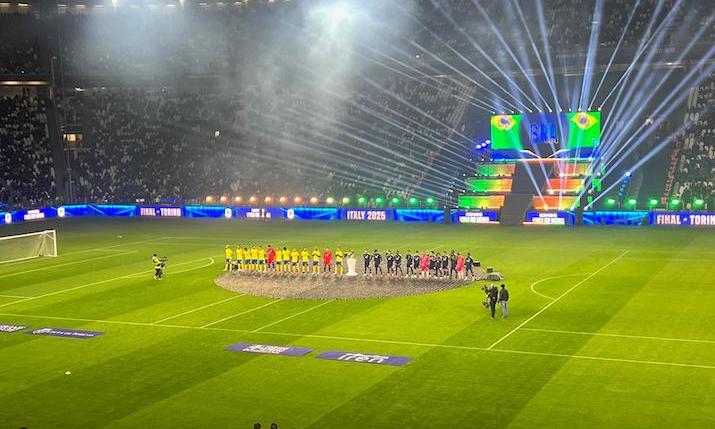The Kings World Cup Nations (KWCN) is a seven-a-side football tournament that combines competitive excitement with spectacle. It features prominent participants, including former football stars, influencers and content creators.
The event involves 16 national teams and is governed by unique rules derived from the original Kings League format, including unlimited substitutions and the availability of ‘secret weapons’ such as double goals and temporary dismissals.
The inaugural edition, held in Italy, began on 1 January 2025 at the Kings League Arena in Milan. Italy made its debut against Japan in the opening match. The tournament continued until the final on 12 January, held at the Allianz Stadium in Turin, where the first Kings World Cup Nations trophy was awarded.
The KWCN achieved an audience of 100 million viewers globally across multiple platforms and recorded 1.5 billion social media impressions. Matches were streamed on platforms such as Twitch, YouTube, Kick, TikTok and Facebook, and broadcast by traditional networks in over 60 countries. In Italy, they aired live on Sky Sport channels, including Sky Sport Max and TV8.
On the pitch, professional football veterans alternated with amateur players during the 40-minute matches, while teams and national squads were led by influencers and streamers acting as team presidents.
Anticipation is now building for the Kings League Italy championship, set to start today (3 February). Created two years ago by former footballer Gerard Piqué, the format primarily targets younger audiences, blending entertainment with sports competition.
EMG Italy’s role
EMG Italy, part of the EMG / Gravity Media group, provides broadcast services for the Kings League, including live coverage and streaming distribution for the KWCN final at the Allianz Stadium and for the Italian championship.
For the KWCN, a team of around 40 professionals managed all technical aspects, such as lighting and LED wall setups, to deliver an immersive experience for both in-person and remote audiences.
The visual design of the format stood out for its modern and engaging approach, elevating the event beyond traditional sports. The Kings League Arena was transformed into a ‘football theatre’, featuring meticulously crafted scenic setups.
Kings League Arena staging
A dynamic lighting and LED wall system was used to create a vibrant, modern atmosphere. Lighting effects highlighted key moments such as team entrances and goal celebrations, as well as sponsor messages. In addition, large LED panels surrounded the pitch, displaying customised graphics, replays, exclusive content, scores, standings and real-time interactive visuals, contributing to an immersive experience.
The Kings League structure covers 6,000sqm, featuring a detailed pitch surrounded by high borders, creating an arena effect reminiscent of American sports events. This setup also caters to online audiences, with innovative camera angles, a drone for aerial shots and augmented reality enhancements during broadcasts. The stands accommodate approximately 400 spectators, offering an intimate and immersive experience for on-site audiences.
Interactive and technological experience
Francesco Donato, CTO of EMG Italy, explains: “We handled the technical setup and production, implementing about 200sqm of scenic LED wall systems. The LED walls, controlled by a complex Watchout system, were used around the pitch perimeter, in the primary camera-facing area and behind the goals to display sponsor content, scores and additional show features.
“We also installed field lighting, delivering 1,200 lux uniformly distributed with LED technology, and several moving heads critical to the event’s visual success. The indoor audio system was separately managed for field coverage and audience diffusion, distinct from the broadcast system.”
Presidents and social streaming
Each team was represented by a president, a content creator with an established fanbase who streamed live commentary from pitch-side setups.
EMG Italy equipped the main control room for managing audio, video, lighting and LED walls in dedicated shelters outside the arena. Around 20 cameras were deployed for live production, providing feeds for presidents/streamers and international broadcasts in English, Italian and Spanish.

Two additional control rooms supported Italian and Spanish integration, with pre- and post-match commentary studios. Feeds were distributed to around 60 international takers via SRT streams.
Donato adds: “The small pitch size significantly influenced the dynamics of camera placement, given the faster pace compared to traditional football. In addition to broadcast-quality pitch cameras, we used micro-cameras behind goals, PTZ units and a lightweight drone to achieve high-quality and dynamic images.”
Control room, VAR, team and setup
The permanent control room, also used for the regular season, coordinated a complex mix of entertainment and sports production. It featured camera, lighting and LED wall control stations, a powerful mixer with three effects desks, four graphic stations, two super motion replay desks and two dedicated VAR desks.
The production team included roles for field activities such as Watchout operators, lighting technicians and a sound designer for arena and broadcast audio management. Dedicated microphone operators supported the presidents’ stations, while two mini-studios for Italian and Spanish unilateral feeds hosted pre- and post-match commentary.
Donato adds: “We’re witnessing a significant shift in audiences and content distribution methods, making events accessible on the move and across a variety of devices, beyond traditional TV screens.
“The sold-out final on 12 January at Allianz Stadium embodied this new global entertainment model, featuring not only the Colombia vs Brazil match but also a Mahmood concert and a Legends vs Streamers special match to enhance the overall show experience.
“It’s fascinating to see how such an event has engaged a broader audience, attracting young people and families – a different demographic from traditional football stadiums.”
